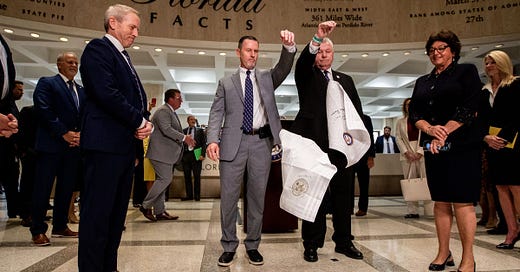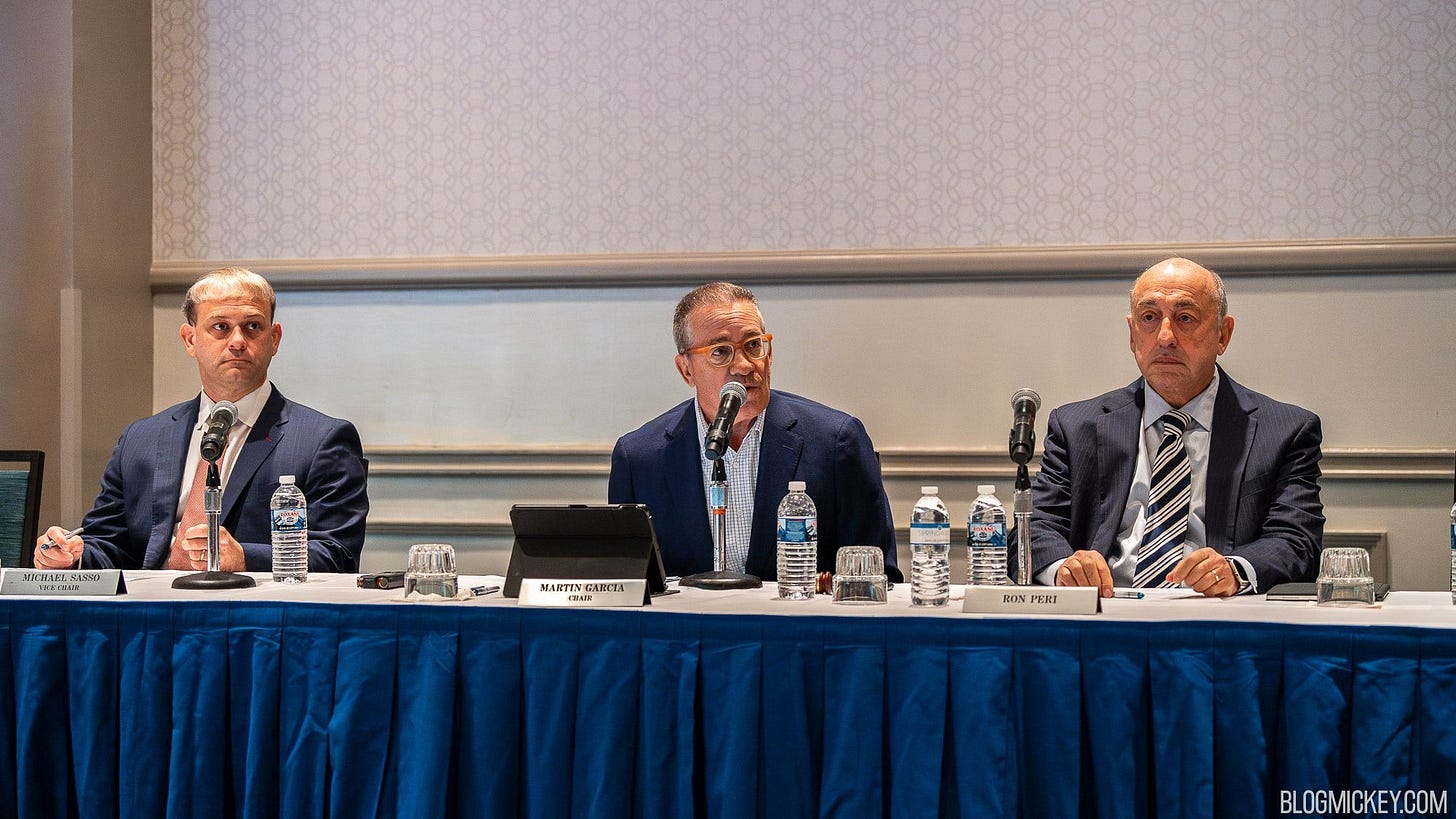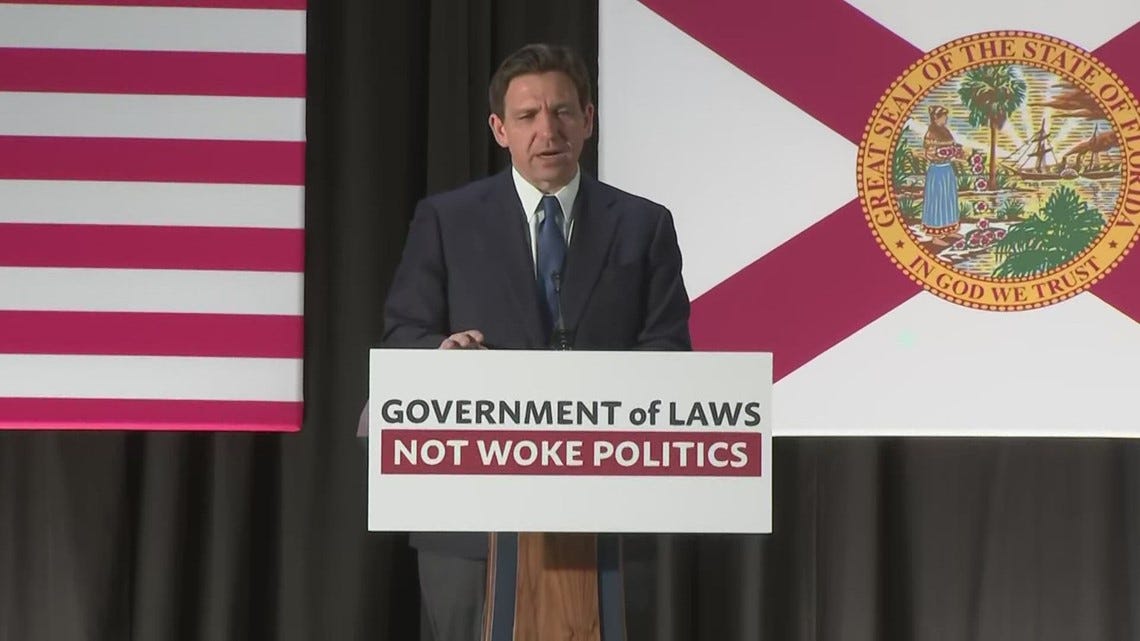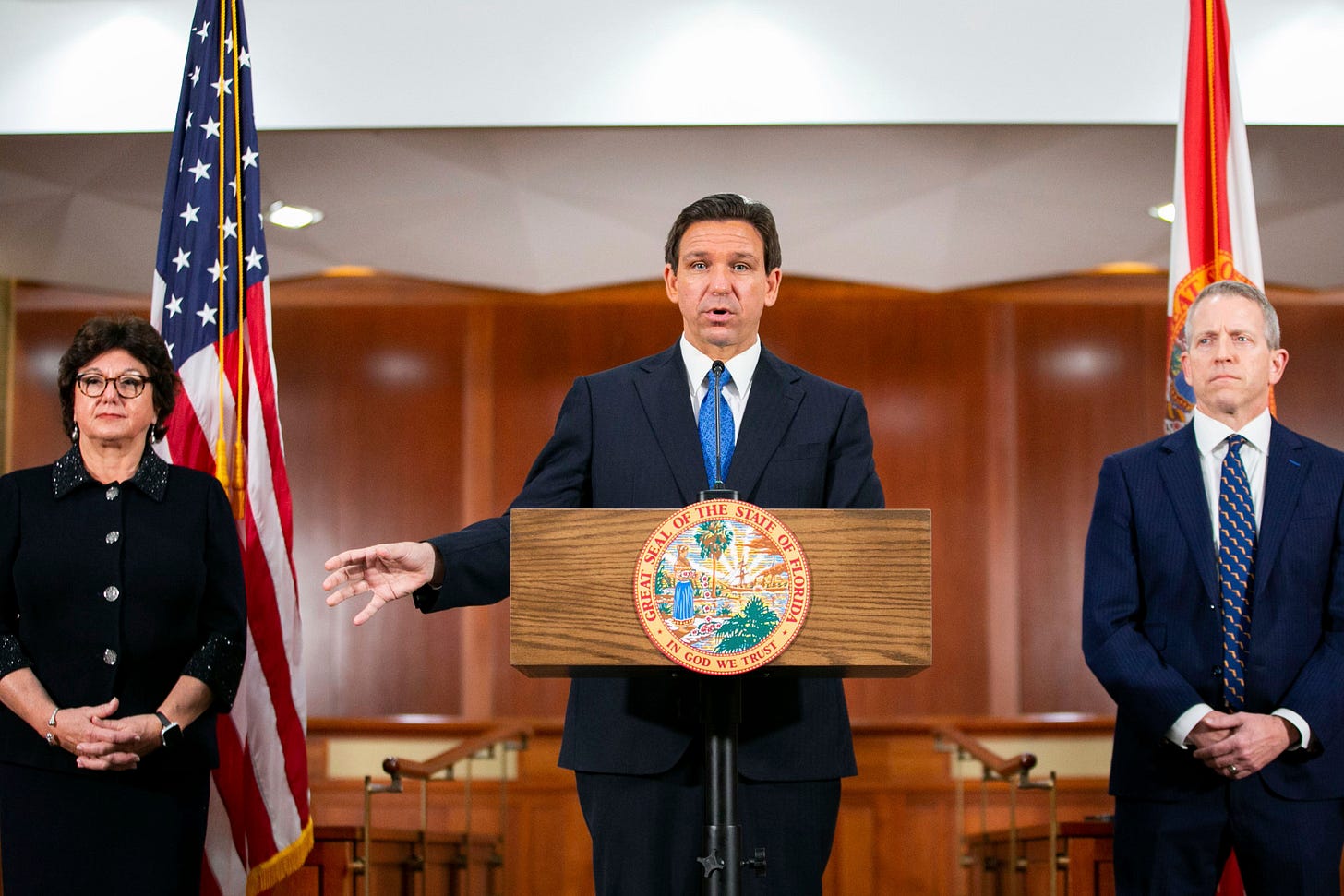Florida's record $117 billion budget, DeSantis-appointed board countersues Disney, anti-ESG bill becomes law, and more...
May 7, 2023 — This Week's Top Stories in Florida
Welcome to this week’s edition of Floridian Today, a newsletter about all things Florida — from politics, business, real estate, and climate. Reporting from the Sunshine State, these are the most important stories you need to know. To never miss an update, subscribe here:
Here’s the latest from Florida…
Florida’s $117 billion budget – the largest ever
On the last day of the 60-day annual Legislative Session, the House and Senate voted to approve the state’s $117 billion total budget – a record amount of spending for the Sunshine State. The spending plan allocates tens of millions of dollars for Gov. DeSantis’ priorities and political objectives, including millions set aside to defend litigation from the state’s legislative efforts that are almost guaranteed to attract legal scrutiny in the courts. The record spending highlights DeSantis’ influence as Republicans yielded to his asks and gave him the necessary funding resources for a political agenda he is likely to tout ahead of a much anticipated presidential bid. This is most apparent in the 600% budget increase for the executive office that lawmakers have given DeSantis since he first took office. Other DeSantis-led programs given preference in funding are the $109 million to support DeSantis’ Florida State Guard, $12 million to continue the controversial migrant relocation flights, and $25 million to further transform New College of Florida into a conservative education destination. Additional investments include $2 billion for the new universal school choice voucher expansion program, with an additional $350 million in reserves if there is a shortfall in the program, and boosts environmental and conservation spending by 17%. State employees will also be getting a 5% pay raise and $711 million will go toward affordable-housing projects. Despite brimming with the governor’s political initiatives and GOP-led priorities, notably, Democrats voted unanimously to approve the annual spending plan. The eye-popping sum appropriated for the state’s 2023-2024 fiscal year is a far cry from the days when reduced program spending and budget cuts were traditionally celebrated and flaunted by Republican political leaders. The budget now heads to Gov. DeSantis, who has the power to issue line-item vetoes for any portion of the agreed-upon $117 billion spending. Last year, he vetoed more than $3 billion in spending, which was a record amount cut for any governor in state history. The budget will take effect on July 1.
Governor-appointed oversight board countersues Disney
Less than a week after Disney sued Gov. Ron DeSantis and board members of the Central Florida Tourism Oversight District (CFTOD) in federal court, the oversight authority voted unanimously to countersue the entertainment giant in state court. Members of the CFTOD also approved defending itself in the federal lawsuit filed by Disney. The decision took place as the oversight board met on Monday to support a motion that permits legal action in response to the company’s lawsuit. The CFTOD seeks to retain its power in overseeing the 39 square miles encompassing Walt Disney World Resort. Disney sued the governor and others for political retaliation and violating their free speech rights that began when DeSantis signed a bill to dissolve the Reedy Creek Improvement District after they spoke out against the state’s so-called “Don’t Say Gay” bill. This action included Walt Disney World being stripped of its self-governing authority and established a new board of governor-appointees to control development over the resort area. Disney is petitioning the court to restore their land development powers and that previous contracts and agreements remain in effect. The newly-filed countersuit by the CFTOD board seeks to uphold its decision to void agreements made by the previous Reedy Creek Improvement District board that curtails their authority and gives Disney greater governing latitude.
Lawmakers pass legislation to void Reedy Creek-Disney agreement
Lawmakers backed Gov. DeSantis and the Central Florida Tourism Oversight District by quickly delivering legislation this week that nullifies the last-minute agreement made between the former governing board of the Reedy Creek Improvement District and Walt Disney World in February. The bill cleared both chambers of the State Legislature this week. It was signed by the governor, overriding the long-term development agreement granted to Disney that undercut the power of the governor’s appointees to the CFTOD. The bills passed largely along party lines in a 75-34 vote in the House and a 27-13 vote in the Senate. Lawmakers gave the special district’s board the authority to void any current and past development agreement going back three months from the date the new governing body of an “independent special district” is elected or appointed. They may also readopt any previous agreement within four months of taking office. Despite the legislative action by the governor and lawmakers, the Disney-DeSantis feud will be settled in the courts. The entertainment company’s lawsuit in federal court alleges the state violated their First Amendment right to free speech, the contract and takings clauses in the Constitution, and their 14th Amendment right to due process.
DeSantis signs anti-ESG bill to combat ‘woke’ investments
Gov. DeSantis has signed HB 3 into law which forbids “environmental, social, and governance” (ESG) standards from being considered in investment decisions by state pension funds. The bill also bans banking institutions from using “social credit scores” in making financial lending decisions. ESG banking prioritizes environmental and social responsibility and good governance practices when determining what companies to invest in. The criteria can include basing investments on issues such as climate change, carbon emissions, social diversity, racial inequality, labor standards, etc. Meanwhile, banks and financial institutions are banned from using “social credit scores” to evaluate an individual’s creditworthiness based on religious, political, social, or ideological beliefs. The new law’s restrictions apply to banks, trusts, and other financial institutions as well as prohibit state and local governments from depositing money or placing pension funds with financial institutions that follow ESG practices. The bill signing follows a decision by DeSantis and other state officials last year to direct investment decisions related to the Florida Retirement System be based on maximizing returns without consideration of ESG factors. Proponents of ESG investing argue that it can help to promote sustainable development and social justice. However, critics argue that ESG standards further ideological or political agendas by companies, can be discriminatory, and lead to lower returns for investors. The law does not prevent state fund managers from investing in companies that follow ESG standards but prevents them from using it as a factor to determine investment decisions. DeSantis said that the bill was necessary to protect the interests of Florida taxpayers and referred to ESG banking as “woke ideology” that is based on political discrimination.
New death penalty law faces certain legal challenges
Gov. DeSantis signed a bill on Monday that would allow the state to pursue the death penalty in sexual battery cases involving children under the age of 12. However, the new law is likely to face legal challenges over its inconsistency with existing U.S. Supreme Court precedence in Kennedy v. Louisiana (2008), which held that the state is barred from imposing capital punishment in crimes in which the victim did not die. The legislation will require a minimum sentence of life in prison without parole for cases of sexual battery against young children but allows prosecutors to seek the death penalty if they identify at least two aggravating factors. The new law, which DeSantis said he is prepared to take all the way to the Supreme Court, voiced his disagreement with the Court ruling and said the “only appropriate punishment is the ultimate punishment” in cases of child rape. At the bill signing, DeSantis called it "a victory for victims," as lawmakers overwhelmingly supported the legislation, including Senate Minority Leader Lauren Book (D-Broward County), who co-sponsored it and is a victim of child sexual abuse. Proponents of the bill argue that it will deter future crimes and deliver justice for child victims by imposing the steepest punishment possible. While the bill takes effect in October, the legal path is uncertain and could be years away from reaching the U.S. Supreme Court on appeal. However, the Court is now more conservative than it was in 2008, and some legal experts believe it is possible that the Court could overturn its own precedent in Kennedy v. Louisiana.
Legislature approves bill to weaken historic preservation in coastal areas
The Florida House and Senate have approved bills that would strip local governments of the power to block the demolition of historic buildings in coastal areas. The bills, SB 1346 and HB 1317, would allow property owners to demolish any building in a designated coastal resiliency zone without the approval of local officials, regardless of its historic preservation status. The bill defines a resiliency zone as an area that is at risk of flooding or storm damage. The Senate bill was sponsored by Sen. Bryan Avila (R-Hialeah Gardens), who said it is needed to protect Florida’s coastline from future storms. The bill would exempt small cities with a population under 10,000 and structures more than 200 years old from the preemption. Lawmakers said that local governments often block the demolition of historic buildings, even if they are in danger of falling down or being damaged by a storm. Supporters argue that the measure would allow property owners to take action more quickly since local governments are often slow to act on demolition requests. They also say it will protect people from aging structures that can pose risks to human safety during flooding and erosion from natural disasters. However, opponents of the bill say it is an attack on local control and that it will lead to the demolition of storied buildings without regard for their historical significance which is important to the character of local communities. One opponent, Sen. Shevrin Jones (D-Miami Gardens) said that the bill is a “giveaway to developers” that “will destroy our history,” stemming from concern that developers will allow aging buildings to fall further into disrepair, allowing them to demolish these properties and redevelop them into high-dollar real estate. Local communities also fear that if becoming law, the legislation would hurt tourism such as Miami Beach’s brightly colored Art Deco district that draws international visitors. The bill was approved by the Senate on a 33-6 vote. It now goes to the House of Representatives for consideration.
Florida ranks No. 1 in education despite DeSantis-led ‘anti-woke’ war over curriculum, books, and faculty
The Sunshine State has been ranked number one in U.S. News & World Report’s nationwide education and higher education rankings. Florida has been placed first nationally in higher education for the seventh consecutive year since it first appeared on the list in 2017. While the U.S. News & World Report ranked Florida No. 1 in education overall, it appears at No. 14 in Pre-K through 12th-grade performance. This data was based on metrics including preschool enrollment rates, standardized test scores, high school graduation rates, and college readiness. Whereas, the higher education rankings consider factors such as the time of college program completion, the cost of tuition and fees, educational attainment, and the amount of student debt alumni carry. The state improved on two of the five metrics versus last year: four-year graduation rate and educational attainment. Florida also boasts the lowest in-state tuition rates at public universities nationwide and ranked eighth in low debt at graduation. The state’s leading education status comes as Gov. DeSantis has gone on the offensive against what he views as “woke ideology” and policies in public education, which has included support for so-called “book bans,” eliminating DEI programs and initiatives, and censoring curriculum with the Parental Rights in Education Act and the Stop WOKE Act.
DeSantis signs ‘Prescription Drug Reform Act’
Increased accountability and transparency will be arriving to the state’s prescription drug market as DeSantis has signed the Prescription Drug Reform Act into law which will offer consumers greater choice among pharmacies, regulate pharmaceutical middlemen, and aims to lower drug prices. SB 1550 will require pharmaceutical companies to publicly report prescription price increases of 15% within one-year or 30% within a three-year period. In an effort to reduce prescription costs for consumers, the new law adds regulations on pharmacy benefit managers (PBMs) and mandates that they pass on negotiated discounts and rebates to patients. PBMs are third-party intermediaries between insurers, pharmacies, and drug manufacturers, and are instrumental in influencing the costs of prescriptions by processing and paying “prescription drug claims, negotiat[ing] rebates with drug manufacturers and establish[ing] networks of pharmacies,” according to the governor’s office. However, PBMs operate with little transparency and the new law seeks to change that by establishing a framework of restrictions that include prohibiting clawbacks, mail order mandates, spread pricing, steering, sharing patient data without consent, and affiliate-only networks. Additionally, PBMs are required to share 100% of all rebates from pharmaceutical companies to consumers to deliver lower drug costs. Under the bill, the Office of Insurance Regulation (OIR) is granted authority to review and investigate PBMs and examine suspected rule violations.
Legislature paves the way for a DeSantis presidential candidacy
As reported last week, the State Legislature approved changes to Florida’s resign-to-run law, which would exempt Gov. DeSantis (or any prospective presidential or vice presidential candidate) from having to resign from office on inauguration day – January 20, 2025 – regardless of who wins the election. However, lawmakers went further to gift the Republican governor with the funding necessary to support a bid for the White House. In budget negotiations, a $3.8 million appropriation was provided to the Florida Department of Law Enforcement (FDLE) for “Protected Operations Services” that would be used to provide security for DeSantis on the campaign trail. This is in addition to the Senate passing a bill that would exempt the governor’s travel records and records of law enforcement providing security to state officials from public disclosure. And then, a $1 million was reserved for vague-sounding “operational support” for the Governor’s Office, which would allow DeSantis and staff to use those funds as they wish. The funding would take effect on July 1, when the 2023-24 budget year begins.
Controversial election changes pass legislature
The Florida House and Senate have passed a bill that would increase fines for third-party voter registration groups that violate election laws and create an exemption for Gov. Ron DeSantis to run for president without resigning from office. The bill, which was passed along party lines in both chambers, would increase fines from $50,000 to $250,000 per year for registration groups that fail to submit completed registration applications to elections offices within ten days. These groups often play a leading role in registering minority voters, which critics argue would make it harder for them to cast their ballots with the measure’s increased penalties. The bill also restricts the time for voters to request a mail-in ballot and specifies that the onus is on individuals – not elections officials – to determine voting eligibility. The latter provision comes following confusion that resulted in the controversial arrest of 20 previously convicted felons last year after they voted in the 2018 election following receipt of voter ID cards erroneously provided by county supervisors of elections. Opponents of the bill say the new changes limit access to voting and target minority voters. It currently awaits signature from Gov. DeSantis.
Low staffing at Florida’s largest hospital network puts patients at risk, per study
HCA Healthcare, the largest for-profit hospital chain in the United States, is accused of understaffing its 49 hospitals in Florida in order to save money and boost profits. The study from the union representing nearly 10,000 healthcare workers at more than a dozen of the state’s HCA hospitals concludes that shareholder returns are the company’s foremost concern over patient safety. The findings were based on interviews with current and former HCA employees, which found that staffing levels at the state’s HCA-owned hospitals are significantly below the national average. The report also found that understaffing is leading to patient safety problems, such as longer wait times for care, medication errors, and failure to monitor vital signs, which has resulted in patient deaths. Earlier this year, congressional lawmakers sent a letter to one of HCA’s hospitals in the state, demanding information on how the company plans to address documented safety issues. HCA has denied the allegations in the union’s report, characterizing them as “misleading and inaccurate,” and saying that it is committed to providing safe and quality care to its patients. However, the federal Centers for Medicare and Medicaid Services (CMS), which administers and oversees health care for more than 100 million Americans, rates hospitals on a five-star performance system, and determined the majority of the state’s HCA hospitals are performing well-below standards. Reports of improper medical care, and unsafe and unsanitary conditions by staff have plagued the company for many years with management accused of ignoring the ongoing problems. HCA reported $5.6 billion in profits last year.
Red flag warning
A red flag warning was issued for a large portion of Florida this week due to a high risk of wildfires resulting from warm temperatures, low humidity, moderate winds, and dry conditions. The red flag warning means that critical fire weather conditions are either occurring or will be soon. Due to the increased risk of fire danger, residents were urged to be cautious with outdoor activities that could potentially start fires and to report any signs of smoke or fires to local authorities immediately.
Rare EF-2 tornado strikes Palm Beach Gardens
Cleanup efforts were underway in Palm Beach Gardens this week after a powerful EF-2 tornado struck the area on Saturday, leaving extensive damage with winds that peaked at 130 mph, the National Weather Service Miami confirmed. The tornado was on the ground for about 11 minutes, creating a path of destruction about 2 miles long and a quarter mile wide. The tornado caused significant damage to homes, businesses, power poles, and vehicles in the area. Photos and videos of the aftermath showed vehicles overturned and stacked on top of each other and went viral across social media. Fortunately, there were no reports of serious injuries or deaths from the tornado.
Upcoming Events Across Florida:
May 11-14: Fish to Fork in Amelia Island
May 13-14: St. Pete Tacos & Tequila Festival
Tacos, margaritas, and delectable treats will be served along the waterfront at St. Petersburg’s Vinoy Park. Dozens of food trucks and vendors will be offering both classic and unique Mexican-inspired cuisine as guests enjoy live music and dancing. Tickets start at $12.
May 13-14: Florida Outdoor Expo in Tampa
May 15-20: Florida Jeep Jam in Panama City Beach
One of the Southeast’s largest events for all things Jeep celebrates its 8th anniversary with a full schedule of activities, including off-road trail excursions, obstacle courses, a beach krawl, a Jeep-only parade, and numerous vendors.
May 18-21: Welcome to Rockville in Daytona Beach
Some of rock’s biggest names will descend on Daytona International Speedway in the return of the four-day outdoor music concert that includes performances by Slipknot, Rob Zombie, The Cult, Avenged Sevenfold, Evanscene, Pantera, Alice Cooper, Deftones, and dozens of other music performances. The event offers campground rentals and many on-site attractions. Single-day tickets for general admission begin at $129.99.
May 18-21: Thunder on Cocoa Beach
The offshore speedboat racing event brings added adrenaline to the Space Coast in four days of competition. Live entertainment, concerts, and block parties will follow each day of racing.
Thanks for reading this edition of Floridian Today. To never miss an update, subscribe for free:
In the meantime, if you learned something or found this read interesting, please consider sharing it to grow our community!











